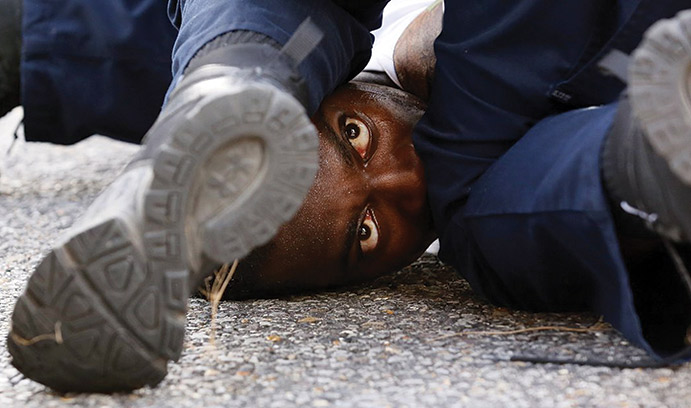The Pros and Cons of Livestreaming Services

Although Facebook Live and other livestreaming services offer citizens a way to question and hold authority accountable, they can also be used to showcase darker impulses and motives, says Jeremy Littau. (Photo by Jonathan Bachman)
Streaming Justice
In early 2017, a group of four Chicagoans tormented and tortured a mentally disabled boy and streamed a 30-minute segment of the horrifying acts through Facebook Live, arguably showcasing humanity at its worst. But the images also presented scholars such as Jeremy Littau, assistant professor of journalism, an unwelcome glimpse into the ways the new and still-evolving media tool is having an impact far beyond the news media.
Within the past year alone, viral videos of fatal police shootings of Alton Sterling in Louisiana and Philando Castile in Minnesota helped social justice advocates make the case that often-fatal shootings of African American men by police officers were happening with disturbing regularity—and that the preceding series of events were not often as clear-cut as they were described by the officers.
"Increasingly, we are seeing Facebook Live being used to hold people in power accountable," says Littau. He and Daxton Stewart, associate dean and associate professor in the Bob Schieffer College of Communication at Texas Christian University, recently published a study in the Journalism and Mass Communication Quarterly. "Up, Periscope: Mobile Streaming Video Technologies, Privacy in Public, and the Right to Record" examines the legal rights of individuals to record and live-stream events, as well as the potential right to be recorded and streamed in public places.
Calling the Facebook Live broadcast of the Castile shooting a "harbinger of what's to come," Littau says that social media users are becoming increasingly savvy about the impact these broadcasts can have.
"You particularly see that in the second half of the last year," he says. "More people were coming to see Facebook Live as a tool with the potential for some important uses, such as giving people a voice. It had a snowball effect for all sorts of reasons, both good and bad."
Within the normal media process, Littau says, the Castile shooting would have been logged in a police blotter, which would have most likely prompted a reporter to write a piece within 10 to 20 hours that included impressions of victims, witnesses and police spokespeople.
"The story would be more distilled, more nuanced," he says. "With Facebook Live, it's more raw, and it puts the power in the hands of people who aren't necessarily trained reporters, but are in effect, citizen reporters."
The method has its drawbacks, of course.
"The nuance is stripped away and you only see where the camera is pointing, and there is no context, which has its own set of complications. When you see something that you are trained to accept—you know, seeing is believing—without the context, it changes the interpretation," he says.
The power of visual images can be easily exploited to sway public opinion, and Littau says he is concerned about those who deliberately provoke confrontations for personal or political gain, or who have an interest in spreading fear like a contagion.
"The reality is," he says, "that there is now the capacity to create these moments with less time to not only absorb the information, but view them with a discerning eye. And if someone's goal is to spread terror, for example, we now have this communication platform that easily provides the means to do that, and achieve that type of immortality that some people seek."
Littau notes that some hate groups have quickly become proficient in harnessing social media to spread their messages and expand their base. In some cases, he says, "it has allowed them to organize very effectively and actually become more mainstream."
Dissident groups push the edge, he says. "And, for better or worse, the edges are where most advances in media technology are happening."
This story appears as "Streaming Justice" in the 2017 Lehigh Research Review.
Posted on:




